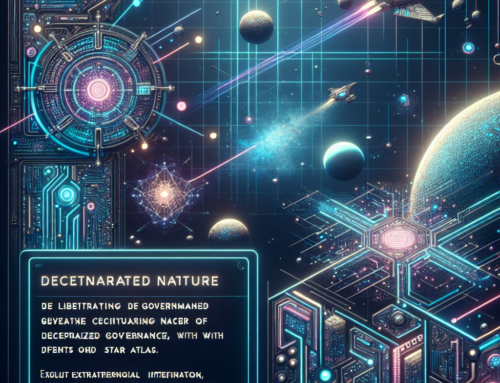Star Atlas: Unveiling Authoritarianism in Gaming

Star Atlas: Unveiling Authoritarianism in Gaming
In the rapidly evolving world of blockchain gaming, Star Atlas stands out as a vibrant universe where players can explore, build, and immerse themselves in intergalactic adventures. However, beyond the excitement of space exploration and economic strategies lies a deeper layer often overlooked—the concept of authoritarianism that can manifest in gaming environments.
What is Authoritarianism in Gaming?
Authoritarianism, in a gaming context, refers to a system where decisions are made by a centralized authority, often without player input or transparency. This dynamic can influence game design, community interactions, and even the economic systems within the game. While it’s common for games to have some level of hierarchy, a more authoritarian structure can lead to player dissatisfaction and a stifling of creativity and freedom.
Centralization vs. Decentralization in Star Atlas
Star Atlas, built on the Solana blockchain, aims to balance exciting gameplay with decentralized governance. Players can own in-game assets as NFTs, allowing for a level of ownership rare in traditional gaming. However, as Star Atlas expands, it’s crucial to examine how centralized powers might influence player experiences in this universe.
Game Development and Governance
The game is built around a deep lore and extensive world-building, which, while great for immersion, also means that much of the game’s direction is dictated by the developers. This centralized approach can feel authoritarian when decisions about the game’s economy or narrative developments are made without substantial community input. While players are encouraged to engage with the game’s governance, the reality is that power dynamics can often leave the core decisions in the hands of a few.
Economic Control
Star Atlas operates on an in-game economy where players can trade and stake tokens. Here, authoritarianism can manifest through economic control—if a small group of players hold significant amounts of resources or influence, they can sway the markets or game narrative. This concentration of power can alienate newer players and create a frustrating environment where the feeling of fairness is compromised.
Community Interaction
The game’s community is vibrant and active, with forums and social media filled with players discussing strategies and sharing experiences. However, community governance must be approached carefully to avoid authoritarian tendencies. If major players or developers suppress dissenting voices or dismiss concerns about game policies, it creates an environment where some players feel marginalized.
Solutions Towards Decentralization
While Star Atlas takes strides toward decentralized governance and community decision-making, players need to remain vigilant. Additional mechanisms that promote transparency, such as voting systems for game updates and community-building initiatives, can help counter potential authoritarian shifts. A robust feedback loop involving the community not only enriches the gaming experience but also reduces the risk of power consolidation.
The Role of Titan Analytics
As a Solana validator and a Star Atlas analytics platform, Titan Analytics is dedicated to providing insights into player behaviors and economic systems within Star Atlas. Our data modules offer a deeper understanding of the game’s dynamics, helping players navigate the universe while being aware of the implications of centralized authority.
To explore our specialized Star Atlas data modules, visit Titan Analytics Star Atlas Data Modules. If you have questions or need further information, feel free to reach out via our contact page.
In this exhilarating frontier of gaming, understanding the implications of authoritarian frameworks is essential for preserving the spirit of exploration and creativity that makes Star Atlas truly special.




